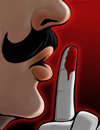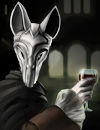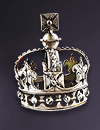The Upstairs: Difference between revisions
mNo edit summary Tags: visualeditor-wikitext mobile web edit mobile edit |
mNo edit summary Tag: visualeditor-wikitext |
||
| Line 16: | Line 16: | ||
== The Revolutionary Council == | == The Revolutionary Council == | ||
''"Smiling marchers reach out to shake your hand, to kiss your cheek. The Revolutionary Parliament is building a new society – one parade, one song, one speech at a time."''<ref name = "cut with moonlight">{{Citation|https://fallenlondon.wiki/wiki/Cut_with_Moonlight|Cut with Moonlight|Fallen London|}}</ref> | ''"Smiling marchers reach out to shake your hand, to kiss your cheek. The Revolutionary Parliament is building a new society – one parade, one song, one speech at a time."''<ref name = "cut with moonlight">{{Citation|https://fallenlondon.wiki/wiki/Cut_with_Moonlight|Cut with Moonlight|Fallen London|}}</ref> | ||
[[File:Featherpin.png|alt=A red flag.|thumb|Revolutionary red.]] | |||
The Upstairs is known as the world where London never fell, but this statement isn't completely accurate; rather than falling to the [[Neath]], London instead "fell" to [[Revolutionaries]]. This version of London is now governed by the '''Revolutionary Council''', a counterpart to the [[Calendar Council]] who rose to power following months of brutal civil war. Their ascent brought peace to the city,<ref>{{Citation|https://fallenlondon.wiki/wiki/Noises_from_Upstairs|Noises from Upstairs|Fallen London|}} ''"The newspaper [...] condemning the Revolutionary Council's ascent to power in London, [...] this ends months of bitter street fighting."''</ref><ref>{{Citation|https://fallenlondon.wiki/wiki/Cut_with_Moonlight|Cut with Moonlight|Fallen London|}} ''"Earl Cardigan held the observatory through a fortnight of Revolutionary shelling."''</ref> and [[The Empress|Queen Victoria]] was forced into exile from London to [[Balmoral]]; she is now known as '''Her Exiled Majesty'''.<ref>{{Citation|https://fallenlondon.wiki/wiki/Cut_with_Moonlight|Cut with Moonlight|Fallen London|}} ''"[...] screams a curse on Her Exiled Majesty, who cowers at Balmoral."''</ref> | |||
After their victory, the Revolutionary Council took over old Parliament and restructured it as the '''Revolutionary Parliament''',<ref>{{Citation|https://fallenlondon.wiki/wiki/Cut_with_Moonlight|Cut with Moonlight|Fallen London|}} ''"The Revolutionary Parliament is building a new society [...]"''</ref> and additionally reformed the [[Church]] of England into a new religion of the '''Everyman'''.<ref>{{Citation|https://fallenlondon.wiki/wiki/Cut_with_Moonlight|Cut with Moonlight|Fallen London|}} ''"[...] lead them in prayer. Not to the [...] new cult of the Everyman [...]"''</ref> Public safety is still managed by the [[Constables]], though they wear black hats as opposed to the familiar blue.<ref>{{Citation|https://fallenlondon.wiki/wiki/Cut_with_Moonlight|Cut with Moonlight|Fallen London|}} ''"Black-capped Constables line the moonlit streets."''</ref> The distribution of goods such as food in the city's various markets, such as [[Spite|Spitalfields]],<ref>{{Citation|https://fallenlondon.wiki/wiki/Cut_with_Moonlight|Cut with Moonlight|Fallen London|}} ''"The moonlight wanes, replaced by gaslight yellow. A narrow face [...] the mushroom-seller [...]"''</ref> is closely monitored by the city's ration inspectors,<ref>{{Citation|https://fallenlondon.wiki/wiki/Cut_with_Moonlight|Cut with Moonlight|Fallen London|}} ''"Ration inspectors prowl the stalls. [...]"''</ref> who may grant allowances to citizens in exchange for the return of mandats, documents which resemble a form of currency.<ref>{{Citation|https://fallenlondon.wiki/wiki/Cut_with_Moonlight|Cut with Moonlight|Fallen London|}} ''"The mandats will buy you [...] a blind eye from the [...] ration inspectors."''</ref> The days of the week were also renamed by the revolutionary government, and the markets of the Upstairs stay open until midnight on what is now called '''Pluto's Day'''.<ref>{{Citation|https://fallenlondon.wiki/wiki/Cut_with_Moonlight|Cut with Moonlight|Fallen London|}} ''"Each week on Pluto's Day, the markets stay open until midnight."''</ref> | After their victory, the Revolutionary Council took over old Parliament and restructured it as the '''Revolutionary Parliament''',<ref>{{Citation|https://fallenlondon.wiki/wiki/Cut_with_Moonlight|Cut with Moonlight|Fallen London|}} ''"The Revolutionary Parliament is building a new society [...]"''</ref> and additionally reformed the [[Church]] of England into a new religion of the '''Everyman'''.<ref>{{Citation|https://fallenlondon.wiki/wiki/Cut_with_Moonlight|Cut with Moonlight|Fallen London|}} ''"[...] lead them in prayer. Not to the [...] new cult of the Everyman [...]"''</ref> Public safety is still managed by the [[Constables]], though they wear black hats as opposed to the familiar blue.<ref>{{Citation|https://fallenlondon.wiki/wiki/Cut_with_Moonlight|Cut with Moonlight|Fallen London|}} ''"Black-capped Constables line the moonlit streets."''</ref> The distribution of goods such as food in the city's various markets, such as [[Spite|Spitalfields]],<ref>{{Citation|https://fallenlondon.wiki/wiki/Cut_with_Moonlight|Cut with Moonlight|Fallen London|}} ''"The moonlight wanes, replaced by gaslight yellow. A narrow face [...] the mushroom-seller [...]"''</ref> is closely monitored by the city's ration inspectors,<ref>{{Citation|https://fallenlondon.wiki/wiki/Cut_with_Moonlight|Cut with Moonlight|Fallen London|}} ''"Ration inspectors prowl the stalls. [...]"''</ref> who may grant allowances to citizens in exchange for the return of mandats, documents which resemble a form of currency.<ref>{{Citation|https://fallenlondon.wiki/wiki/Cut_with_Moonlight|Cut with Moonlight|Fallen London|}} ''"The mandats will buy you [...] a blind eye from the [...] ration inspectors."''</ref> The days of the week were also renamed by the revolutionary government, and the markets of the Upstairs stay open until midnight on what is now called '''Pluto's Day'''.<ref>{{Citation|https://fallenlondon.wiki/wiki/Cut_with_Moonlight|Cut with Moonlight|Fallen London|}} ''"Each week on Pluto's Day, the markets stay open until midnight."''</ref> | ||
| Line 25: | Line 25: | ||
=== The March Bureau === | === The March Bureau === | ||
''"The latest of the March Bureau's parades is underway – this one is to commemorate the York Martyrs, gunned down by her Exiled Majesty's soldiers. You hear the approaching stamp of feet."''<ref name = "cut with moonlight"/> | ''"The latest of the March Bureau's parades is underway – this one is to commemorate the York Martyrs, gunned down by her Exiled Majesty's soldiers. You hear the approaching stamp of feet."''<ref name = "cut with moonlight"/> | ||
The '''March Bureau''' is the most prominent sector of the Revolutionary Council, whose seal design contains a trumpet and flag.<ref>{{Citation|https://fallenlondon.wiki/wiki/Cut_with_Moonlight|Cut with Moonlight|Fallen London|}} ''"[...] stamped with the trumpet-and-flag of the March Bureau [...]"''</ref> The Bureau often holds various parades to commemorate the revolution; one such parade through [[Veilgarden|Covent Garden]] celebrates the seven '''York Martyrs''', who were shot by the Queen's forces for speaking out against the old monarchic order.<ref>{{Citation|https://fallenlondon.wiki/wiki/Cut_with_Moonlight|Cut with Moonlight|Fallen London|}} ''"[...] latest of the March Bureau's parades [...] this one is to commemorate the York Martyrs, gunned down by her Exiled Majesty's soldiers."''</ref><ref>{{Citation|https://fallenlondon.wiki/wiki/Cut_with_Moonlight|Cut with Moonlight|Fallen London|}} ''"At Trafalgar Square [...] light seven candles. One for each of the Martyrs [...] executed for daring to speak against the old order."''</ref> The March Bureau is also responsible for keeping the district of [[Watchmaker's Hill|Greenwich]] clear of dangerous canines known as the '''Pale Dogs''', and they do so by offering mandats to anyone who brings in their pelts.<ref>{{Citation|https://fallenlondon.wiki/wiki/Cut_with_Moonlight|Cut with Moonlight|Fallen London|}} ''"High on its hill jut [...] the observatory. [...] Pale Dogs are hunting. [...] The March Bureau offer a reward for their pelts: crisp mandats [...]"''</ref> Sadly, the Royal Observatory in Greenwich was destroyed after it was used a stronghold by royalists during the civil war.<ref>{{Citation|https://fallenlondon.wiki/wiki/Cut_with_Moonlight|Cut with Moonlight|Fallen London|}} ''"[...] the rubble is scarred by war. [...] Earl Cardigan held the observatory through a fortnight of Revolutionary shelling."''</ref> | The '''March Bureau''' is the most prominent sector of the Revolutionary Council, whose seal design contains a trumpet and flag.<ref>{{Citation|https://fallenlondon.wiki/wiki/Cut_with_Moonlight|Cut with Moonlight|Fallen London|}} ''"[...] stamped with the trumpet-and-flag of the March Bureau [...]"''</ref> The Bureau often holds various parades to commemorate the revolution; one such parade through [[Veilgarden|Covent Garden]] celebrates the seven '''York Martyrs''', who were shot by the Queen's forces for speaking out against the old monarchic order.<ref>{{Citation|https://fallenlondon.wiki/wiki/Cut_with_Moonlight|Cut with Moonlight|Fallen London|}} ''"[...] latest of the March Bureau's parades [...] this one is to commemorate the York Martyrs, gunned down by her Exiled Majesty's soldiers."''</ref><ref>{{Citation|https://fallenlondon.wiki/wiki/Cut_with_Moonlight|Cut with Moonlight|Fallen London|}} ''"At Trafalgar Square [...] light seven candles. One for each of the Martyrs [...] executed for daring to speak against the old order."''</ref> The March Bureau is also responsible for keeping the district of [[Watchmaker's Hill|Greenwich]] clear of dangerous canines known as the '''Pale Dogs''', and they do so by offering mandats to anyone who brings in their pelts.<ref>{{Citation|https://fallenlondon.wiki/wiki/Cut_with_Moonlight|Cut with Moonlight|Fallen London|}} ''"High on its hill jut [...] the observatory. [...] Pale Dogs are hunting. [...] The March Bureau offer a reward for their pelts: crisp mandats [...]"''</ref> Sadly, the Royal Observatory in Greenwich was destroyed after it was used a stronghold by royalists during the civil war.<ref>{{Citation|https://fallenlondon.wiki/wiki/Cut_with_Moonlight|Cut with Moonlight|Fallen London|}} ''"[...] the rubble is scarred by war. [...] Earl Cardigan held the observatory through a fortnight of Revolutionary shelling."''</ref> | ||
| Line 40: | Line 40: | ||
''"Moonlight burns on the marble of the arch. It limns the gallows in silver. It highlights the muzzle of the executioner's dog mask, the sign of the December Office. The crowd bays for a hanging."''<ref name = "cut with moonlight"/> | ''"Moonlight burns on the marble of the arch. It limns the gallows in silver. It highlights the muzzle of the executioner's dog mask, the sign of the December Office. The crowd bays for a hanging."''<ref name = "cut with moonlight"/> | ||
[[File:DecemberMask.png|alt=An individual wearing a white mask.|thumb|[[December]]]] | [[File:DecemberMask.png|alt=An individual wearing a white mask.|thumb|[[December]]]] | ||
The '''December Office''' is responsible for the executions in London | The '''December Office''' is known to be responsible for the executions in London. Their executioners wear white canine masks,<ref>{{Citation|https://fallenlondon.wiki/wiki/Cut_with_Moonlight|Cut with Moonlight|Fallen London|}} ''"[...] the executioner's dog mask, the sign of the December Office."''</ref> not unlike the mask of [[December]].<ref>{{Citation|https://fallenlondon.wiki/wiki/Converse_with_a_stranger|Converse with a stranger|Fallen London|}}</ref> The Office converted the Marble Arch of [[Ladybones Road|Marylebone]] into a hangman's arch,<ref>{{Citation|https://fallenlondon.wiki/wiki/Cut_with_Moonlight|Cut with Moonlight|Fallen London|}} ''"Moonlight burns on the marble of the arch. It limns the gallows in silver."''</ref> which they use to execute political prisoners, such as unpopular Lords of the old Parliament.<ref>{{Citation|https://fallenlondon.wiki/wiki/Cut_with_Moonlight|Cut with Moonlight|Fallen London|}} ''"The condemned [...] This is justice: he was one of the Lords who opposed the revolution. His vote sent troops into Cheapside."''</ref> | ||
December appears to still be active in the Upstairs, and as such is a frequent recipient of death threats from the city's counterrevolutionaries.<ref>{{Citation|https://fallenlondon.wiki/wiki/Cut_with_Moonlight|Cut with Moonlight|Fallen London|}} ''"For Balmoral! Death to December!"''</ref> | December appears to still be active in the Upstairs, and as such is a frequent recipient of death threats from the city's counterrevolutionaries.<ref>{{Citation|https://fallenlondon.wiki/wiki/Cut_with_Moonlight|Cut with Moonlight|Fallen London|}} ''"For Balmoral! Death to December!"''</ref> | ||
Revision as of 01:03, 14 November 2021

|
Beyond this point lie major spoilers for Fallen London, Sunless Sea, Sunless Skies, or Mask of the Rose. This may include endgame or major Fate-locked spoilers. Proceed at your own risk. You can find out more about our spoiler policy here. |
"You find the parson balanced atop a pile of furniture. He is daubing a message on the ceiling in a concoction of ash from the fireplace and wine from the cabinet. 'THE BATS NEVER CAME,' it reads."[1]
The Upstairs is a version of London that never came down to the Neath. Visions of this place can be seen through exposure to moonlight.
Under the Moonlight
"Another one gone Upstairs. What is wrong with our d__n sunlight?"[1]

The Upstairs is a vision of a world where London never sank to the Neath.[2] It can be experienced through moonlight in any location in the Neath that was once part of Britain when it was still on the Surface.[3] Each vision of the Upstairs in the Neath corresponds with its former location on the Surface, so a vision experienced in Ladybones Road would show the Upstairs' version of Marylebone near the Marble Arch.[4]
Certain sunlight smugglers mix their product with moonlight to lower costs,[5][6] which may inadvertently cause their customers to "go Upstairs".[7] This can cause false memories,[8] or in severe cases, delusions and hallucinations akin to being honey-mazed.[9] Thus, experiencing the Upstairs can be incredibly taxing on a person's sanity,[10] to say nothing of the ruckus they might cause during their visions.[11]
Being on the Surface, the Upstairs is usually lit by the Moon, with stars twinkling in the night sky,[12] though it is possible to see daylight through the Upstairs as well.[13] Sailors - not zailors! - toil away at the docks of London, drinking and smoking as they normally would. From afar, the city seems exactly as it was - other than the extreme political tensions that simmer in the air, as if fighting could once again erupt any moment.[14]
The Revolutionary Council
"Smiling marchers reach out to shake your hand, to kiss your cheek. The Revolutionary Parliament is building a new society – one parade, one song, one speech at a time."[1]

The Upstairs is known as the world where London never fell, but this statement isn't completely accurate; rather than falling to the Neath, London instead "fell" to Revolutionaries. This version of London is now governed by the Revolutionary Council, a counterpart to the Calendar Council who rose to power following months of brutal civil war. Their ascent brought peace to the city,[15][16] and Queen Victoria was forced into exile from London to Balmoral; she is now known as Her Exiled Majesty.[17]
After their victory, the Revolutionary Council took over old Parliament and restructured it as the Revolutionary Parliament,[18] and additionally reformed the Church of England into a new religion of the Everyman.[19] Public safety is still managed by the Constables, though they wear black hats as opposed to the familiar blue.[20] The distribution of goods such as food in the city's various markets, such as Spitalfields,[21] is closely monitored by the city's ration inspectors,[22] who may grant allowances to citizens in exchange for the return of mandats, documents which resemble a form of currency.[23] The days of the week were also renamed by the revolutionary government, and the markets of the Upstairs stay open until midnight on what is now called Pluto's Day.[24]
The Revolutionary Council is composed of several bureaus and offices, each of which is named after a month of the calendar. While these divisions work efficiently and hold significant power, some of them also suffer from corruption and infighting.[25][26]
The March Bureau
"The latest of the March Bureau's parades is underway – this one is to commemorate the York Martyrs, gunned down by her Exiled Majesty's soldiers. You hear the approaching stamp of feet."[1]
The March Bureau is the most prominent sector of the Revolutionary Council, whose seal design contains a trumpet and flag.[27] The Bureau often holds various parades to commemorate the revolution; one such parade through Covent Garden celebrates the seven York Martyrs, who were shot by the Queen's forces for speaking out against the old monarchic order.[28][29] The March Bureau is also responsible for keeping the district of Greenwich clear of dangerous canines known as the Pale Dogs, and they do so by offering mandats to anyone who brings in their pelts.[30] Sadly, the Royal Observatory in Greenwich was destroyed after it was used a stronghold by royalists during the civil war.[31]
An organization known as the Marchists is known to exist,[26] though its purpose and goals are unknown. As for March themselves, their status in the Upstairs is unknown.
The September Bureau
"You push to the front, where Inspectors of the September Bureau keep the crowd at bay. A wrinkled flower-seller screams a curse on Her Exiled Majesty, who cowers at Balmoral. You join in."[1]
The September Bureau is known to employ Inspectors, who manage a ledger of the enemies of the revolution and also maintain public order when those wanted are captured and hanged.[32][33]
September himself is unfortunately deceased in the Upstairs, and has thus become a martyr for various revolutionary groups.[34] It is unknown whether his title was passed on to another person after his death.
The December Office
"Moonlight burns on the marble of the arch. It limns the gallows in silver. It highlights the muzzle of the executioner's dog mask, the sign of the December Office. The crowd bays for a hanging."[1]

The December Office is known to be responsible for the executions in London. Their executioners wear white canine masks,[35] not unlike the mask of December.[36] The Office converted the Marble Arch of Marylebone into a hangman's arch,[37] which they use to execute political prisoners, such as unpopular Lords of the old Parliament.[38]
December appears to still be active in the Upstairs, and as such is a frequent recipient of death threats from the city's counterrevolutionaries.[39]
Coldstream Opposition
"On the far side of the stampeding crowd, you see a man climb on a cart. He wears a red uniform, belted with white – the colours of the Coldstream counter-revolutionaries. "For her Majesty!" he cries. "For Balmoral! Death to December!""[1]

The Queen may be in exile, but many royalists still remain active in and around London.[40] The most prominent royalist force in London are the Coldstream counter-revolutionaries, who wear uniforms of red with white accents,[41] and fly a flag consisting of a "red cross inside a blue circle, inside a white star".[42]
A large group of Coldstream operatives are headquartered in a village near the coast of London.[43] There, they store and maintain their uniforms and weaponry,[44][45] and formulate plans using reports of the known members and weaker links of the Revolutionary Council.[46] The soldiers then stage riots and explosive attacks near locations of strategic interest to disrupt the Council, though their actions often result in civilian causalities.[47][48]
The Septemberist Revolution
"The moon crests the hill behind the Castle, silvering its mullioned windows. Here in the woods the air is thick with smoke and hushed with quiet, fretful chatter. Beyond the river, the alliance of France, the Unions and the March Bureau gather, ready for revenge for Lost September."[49]
"Her Majesty sieged. Consort in the cairn. Be brave fir our lads in scarlet. There's silver in th' wood. Might be I don't catch you awhile."[50]

September in the Upstairs was a popular revolutionary, well-known for his impassioned speech in the Pall Mall about the end to the tyranny of the British Empire and the Union. Unfortunately, he was arrested soon after and locked in the cells of Kensington Palace, where he died of starvation. After Queen Victoria was forced into exile, however, a group of revolutionaries known as the Septemberists began their march to Balmoral in September's name, under a red banner.[51][52] The Queen's remaining army, including the Queen's Household Guard, mobilized to defend the castle, and a series of brutal skirmishes between the two factions began.[53]

The Septemberists laid siege to Balmoral,[50] damaging the castle's outer walls and even constructing a guillotine nearby.[54] However, loyalists to the Queen held them back from taking the castle itself,[52] and the ensuing fighting turned the woods of Balmoral into a battleground that ran red with spilled blood.[55] Other nearby locations, such as the River Forth, would also become theaters of the conflict.[56]
The Septemberists suffered heavy casualties due to loyalist ambushes,[55] though they would not be fighting alone forever; the cause of the followers of Lost September drew the attention of the Third Republic of France, the Union, the March Bureau,[57] and the Celtic Republics to come to the Septemberists' aid.[58] With the help of their allies, the Septemberists' revolution may yet be on the horizon, and the last stronghold of the Queen may soon be broken,[59] but the Upstairs will always remain a timeline that will never come to pass.[60]
References
- ↑ 1.0 1.1 1.2 1.3 1.4 1.5 1.6 Cut with Moonlight, Fallen London
- ↑ Consider the Moonlight (45 FATE), Fallen London
- ↑ Cut with Moonlight, Fallen London "You huddle under the stall to avoid the trampling feet. The screams fade. The moonlight wanes, replaced by gaslight yellow."
- ↑ Cut with Moonlight, Fallen London "Moonlight burns on the marble of the arch."
- ↑ Cut with Moonlight, Fallen London "Once we've built up some funds, we can import pure sunlight, and put this whole Upstairs business to rest."
- ↑ Cut with Moonlight, Fallen London "Anyway, it's diluted with moonlight: easier to transport [...]"
- ↑ Cut with Moonlight, Fallen London "Another one gone Upstairs. What is wrong with our d__n sunlight?"
- ↑ Cut with Moonlight, Fallen London ""Been sampling the stock, young master? [...] "Mathilde – we promised to marry. Remember [...] "You're addled! Leave me be!""
- ↑ Cut with Moonlight, Fallen London "I hope I didn't do anything too awful. For a time I was in another place."
- ↑ Cut with Moonlight, Fallen London "Sometimes I see moonlight, and another London. I am not sure which of them is correct; they both seem unlikely."
- ↑ Cut with Moonlight, Fallen London "Wrestling him to the ground [...] He shouts as they drag him away. "Septemberist traitors! [...]"''
- ↑ Noises from Upstairs, Fallen London "The moon is outside. [...] stars hang in the sky – real stars [...]"
- ↑ Wander the glades, Fallen London "The sun is choked with mists and the smoke of cannon-fire."
- ↑ Noises from Upstairs, Fallen London "Sailors cluster outside a wharfside pub, puffing on pipes. [...] the scene has an intangible tension, as if fighting could break out at any moment."
- ↑ Noises from Upstairs, Fallen London "The newspaper [...] condemning the Revolutionary Council's ascent to power in London, [...] this ends months of bitter street fighting."
- ↑ Cut with Moonlight, Fallen London "Earl Cardigan held the observatory through a fortnight of Revolutionary shelling."
- ↑ Cut with Moonlight, Fallen London "[...] screams a curse on Her Exiled Majesty, who cowers at Balmoral."
- ↑ Cut with Moonlight, Fallen London "The Revolutionary Parliament is building a new society [...]"
- ↑ Cut with Moonlight, Fallen London "[...] lead them in prayer. Not to the [...] new cult of the Everyman [...]"
- ↑ Cut with Moonlight, Fallen London "Black-capped Constables line the moonlit streets."
- ↑ Cut with Moonlight, Fallen London "The moonlight wanes, replaced by gaslight yellow. A narrow face [...] the mushroom-seller [...]"
- ↑ Cut with Moonlight, Fallen London "Ration inspectors prowl the stalls. [...]"
- ↑ Cut with Moonlight, Fallen London "The mandats will buy you [...] a blind eye from the [...] ration inspectors."
- ↑ Cut with Moonlight, Fallen London "Each week on Pluto's Day, the markets stay open until midnight."
- ↑ Cut with Moonlight, Fallen London "[...] the March Bureau's parades is underway [...]"
- ↑ 26.0 26.1 Noises from Upstairs, Fallen London "[...] reporting divisions within the Council [...] corruption inside the Marchists [...]"
- ↑ Cut with Moonlight, Fallen London "[...] stamped with the trumpet-and-flag of the March Bureau [...]"
- ↑ Cut with Moonlight, Fallen London "[...] latest of the March Bureau's parades [...] this one is to commemorate the York Martyrs, gunned down by her Exiled Majesty's soldiers."
- ↑ Cut with Moonlight, Fallen London "At Trafalgar Square [...] light seven candles. One for each of the Martyrs [...] executed for daring to speak against the old order."
- ↑ Cut with Moonlight, Fallen London "High on its hill jut [...] the observatory. [...] Pale Dogs are hunting. [...] The March Bureau offer a reward for their pelts: crisp mandats [...]"
- ↑ Cut with Moonlight, Fallen London "[...] the rubble is scarred by war. [...] Earl Cardigan held the observatory through a fortnight of Revolutionary shelling."
- ↑ Cut with Moonlight, Fallen London "Inspectors of the September Bureau observe from the sidelines."
- ↑ Cut with Moonlight, Fallen London "The condemned man thrashes [...] his legs finish kicking, the Inspectors cross a name off their list. [...] Inspectors of the September Bureau keep the crowd at bay."
- ↑ Balmoral As Before, Fallen London
- ↑ Cut with Moonlight, Fallen London "[...] the executioner's dog mask, the sign of the December Office."
- ↑ Converse with a stranger, Fallen London
- ↑ Cut with Moonlight, Fallen London "Moonlight burns on the marble of the arch. It limns the gallows in silver."
- ↑ Cut with Moonlight, Fallen London "The condemned [...] This is justice: he was one of the Lords who opposed the revolution. His vote sent troops into Cheapside."
- ↑ Cut with Moonlight, Fallen London "For Balmoral! Death to December!"
- ↑ Cut with Moonlight, Fallen London "Septemberist traitors! Long live the Queen! Her Exiled Majesty!"
- ↑ Cut with Moonlight, Fallen London "He wears a red uniform, belted with white – the colours of the Coldstream counter-revolutionaries."
- ↑ Noises from Upstairs, Fallen London "On the wall, a tattered flag shows a red cross inside a blue circle, inside a white star."
- ↑ Noises from Upstairs, Fallen London "Brinehouse is a coastal village and former docks."
- ↑ Noises from Upstairs, Fallen London "Boxes of ordnance are piled in the corners."
- ↑ Noises from Upstairs, Fallen London "[...] there are officers' jackets [...] shaving mirrors and boot polish"
- ↑ Noises from Upstairs, Fallen London "[...] display boards. One features newspaper reports, covering divisions within the Revolutionary Council. Another is a [...] gallery of faces, with handwritten annotations. Some [...] have been crossed out."
- ↑ Cut with Moonlight, Fallen London "You push through the crowd. The attackers are Coldstream counter-revolutionaries. [...] one of them [...] throwing something into a post office. Fire blooms from its shattered windows."
- ↑ Noises from Upstairs, Fallen London "[...] it reserves its condemnation for Coldstream counter-revolutionaries, with horrifying stories of civilians maimed in explosions or trampled in riots."
- ↑ Balmoral As Before, Fallen London
- ↑ 50.0 50.1 Compel the Ghillie to extend your visit, Fallen London
- ↑ Accompany September, Fallen London "September listens [...] He hears his name [...] repetitions of the speech he gave on Pall Mall, of an end to Union and the Empire and thus to all tyrants. [...] the thundering wheels of the Empress' coach and the long slow starvation in some black cell below the Palace. [...] those who came out to the streets in his name and marched north."
- ↑ 52.0 52.1 Flatter the Ghillie into extending your visit, Fallen London
- ↑ Lay a trail, Fallen London "Septemberists or the Queen's Household Guard. Can one tell the difference in the dark?"
- ↑ Leave the woods 3, Fallen London "Balmoral stands [...] its walls blackened [...] its windows broken. [...] Someone has erected a guillotine on the lawn [...]"
- ↑ 55.0 55.1 Wander the woods, Fallen London
- ↑ Leave the woods, Fallen London "When the balladeers held the Forth till the water ran crimson [...]"
- ↑ Accompany September, Fallen London "[...] individual components of the force [...] the Third Republic, [...] the Union, [...] the March Bureau."
- ↑ Wander the glades, Fallen London
- ↑ Unveil your Painting (Incendiary %2B Luminosity), Fallen London
- ↑ Explore the woods, Fallen London